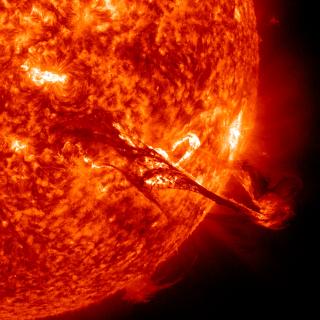Bibcode
Khomenko, E.; Collados, M.
Referencia bibliográfica
The Astrophysical Journal, Volume 747, Issue 2, article id. 87 (2012).
Fecha de publicación:
3
2012
Revista
Número de citas
159
Número de citas referidas
150
Descripción
In this paper, we study the heating of the magnetized solar chromosphere
induced by the large fraction of neutral atoms present in this layer.
The presence of neutrals, together with the decrease with height of the
collisional coupling, leads to deviations from the classical
magnetohydrodynamic behavior of the chromospheric plasma. A relative net
motion appears between the neutral and ionized components, usually
referred to as ambipolar diffusion. The dissipation of currents in the
chromosphere is enhanced by orders of magnitude due to the action of
ambipolar diffusion, as compared with the standard ohmic diffusion. We
propose that a significant amount of magnetic energy can be released to
the chromosphere just by existing force-free 10-40 G magnetic fields
there. As a consequence, we conclude that ambipolar diffusion is an
important process that should be included in chromospheric heating
models, as it has the potential to rapidly heat the chromosphere. We
perform analytical estimations and numerical simulations to prove this
idea.
Proyectos relacionados

Magnestismo Solar y Estelar
Los campos magnéticos son uno de los ingredientes fundamentales en la formación de estrellas y su evolución. En el nacimiento de una estrella, los campos magnéticos llegan a frenar su rotación durante el colapso de la nube molecular, y en el fin de la vida de una estrella, el magnetismo puede ser clave en la forma en la que se pierden las capas
Tobías
Felipe García